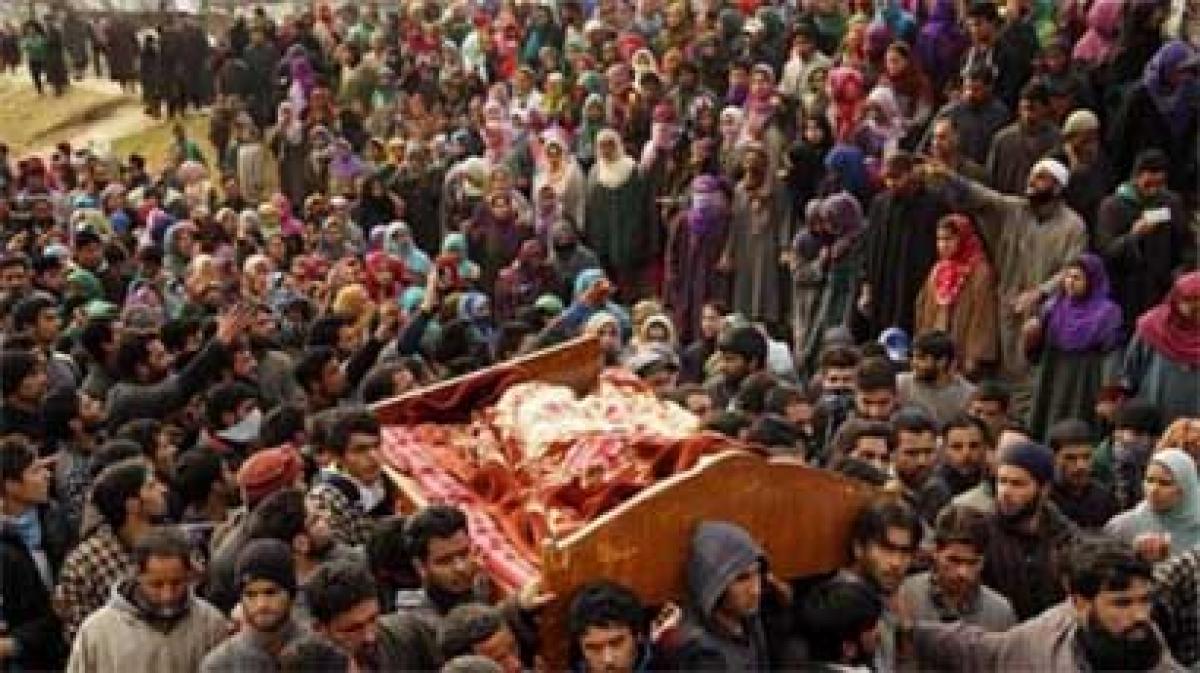Live
- State government to Supreme Court: New guidelines on how to apply anti-gangster law in UP
- CM Chandrababu to unveil Vision 2047 document today in Vijayawada, traffic restrictions imposed
- State-level LIMES-2k24 inaugurated
- UP to establish ‘Har Ghar Jal’ village at Mahakumbh 2025
- NDA needs support of 361 LS MPs: Cabinet gives nod to bill for 'one nation one election'
- Kejriwal woos women voters with Rs 2100
- Transforming leftovers: 2 innovative recipe ideas
- MLA seeks shipbuilding industry at Chinnaganjam
- Papon marks 20 years in music: A journey of soulful versatility
- Jasleen Royal to collaborate with Coldplay at ‘Music of the Spheres World Tour’
Just In

Civilian deaths due to terrorism related violence has come down by over 90 percent since the 1990s according to government data released on the issue on Thursday.
Civilian deaths due to terrorism related violence has come down by over 90 percent since the 1990s according to government data released on the issue on Thursday.
Categorised under four heads, namely, number of terror or insurgent-related incidents, civilians killed by terrorists in violence, security forces (SFS) killed by terrorists and terrorists killed, the government data covering a period of 25 years i.e. from 1990 to 2015, shows that in 1990, there were 4158 incidents of terrorist-related violence in which 461 civilians, 155 security force personnel and 550 terrorists were killed.
By 2015, however, statistics reveal a drastic drop of 208 incidents of terrorist-related violence in which 17 civilians, 39 security force personnel and 108 terrorists were killed. This significant reduction in civilian deaths in an insurgent-hit state like Jammu and Kashmir is testimony to the combined success of the various counter-terrorist and counter-insurgency steps taken by Centre, the state administration and the Unified Command to restore peace and normalcy.
A measure of the success of this ongoing drive to eliminate terrorists is further substantiated by the fact that in the period between January 1, 2016 and February 8, 2016, the government data reveals 16 incidents of terrorist-related violence in which there were no civilian or security force personnel deaths, but on the other hand, ten terrorists were killed.
According to the data, terrorist or insurgent-related violence, which commenced in 1988-89, peaked between 1992 and 1996, with the year 1996 recording the highest number of civilian deaths (1341), followed by 1031 civilian deaths in 1995. The year 1995 reports the highest number of terrorist incidents (5938), followed by 5829 in 1994, 5247 in 1993 and 4817 in 1992.
In this period of five years (1992-1996), the government data reveals a highest figure of 1596 terrorists being eliminated in 1994, followed by 1332 in 1995 and 1310 in 1993.
From 2007 onwards, civilian deaths start dropping. In 2007, 158 civilians were killed and 110 security force personnel. In 2012, the death toll was 15 civilians and 15 security force personnel and in 2016, the toll was nil in both categories till February 8.
As per the data, in the last 25 years (1990-2015), 13921 civilians and 4961 security force personnel have lost their lives to terrorist-related violence in Jammu and Kashmir. In contrast, over the same period, 21780 terrorists have been eliminated.
The roots of the insurgency are tied to a perceived dispute over local autonomy. In 1987, a disputed state election served as a catalyst for the insurgency. In July 1988 a series of demonstrations, strikes and attacks on government institutions laid the base for insurgency, which during the 1990s, escalated into a major internal security challenge.
Over the past eight-and-a-half years, the government data reveals that there has been a perceptible improvement in the internal security environment due to decline in incidents of terrorist violence.
A measure of the progressive improvement in the overall security environment was the fact that in 2012 and 2013, over one million tourists visited Jammu and Kashmir.
The administration at all levels have also introduced, adopted and enforced new standard operating procedures that serve as a guideline for security forces to minimise collateral damages during counter insurgency operations.
The government is on record as saying that it is committed to a policy of zero tolerance of any human rights violation and will take deterrent action against anyone violating it.
The progressive improvement in the security environment has enabled the government to reduce the visibility of the security forces and their footprint in areas inhabited by civilians by relocating and redeploying them.

© 2024 Hyderabad Media House Limited/The Hans India. All rights reserved. Powered by hocalwire.com







